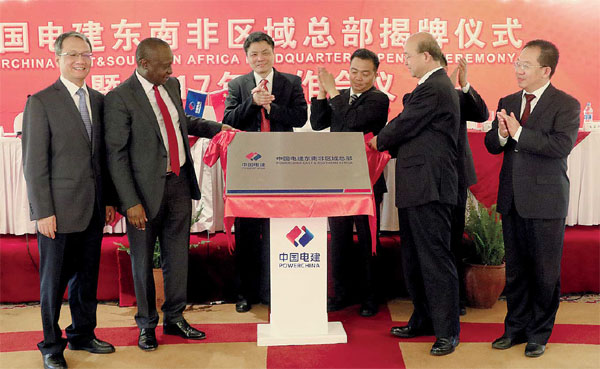Powering a brighter future for Africa
Chinese electricity giant steps in to help continent create a more extensive and reliable network
Power Construction Corp of China (PowerChina), a multinational group headquartered in Beijing, is looking at expanding its investment in Africa, which is suffering from power shortages.
Despite being rich in fossil fuels and renewable resources, Africa suffers from limited access to electricity, which affects investment decisions and potential growth.
According to World Bank statistics, the 48 countries that make up Sub-Saharan Africa (with a combined population of 800 million) generate roughly the same amount of power as Spain (with a population of 45 million) - meaning a large percentage of the population doesn't have access to reliable energy.
|
Liu Xianfa (second from right), the Chinese ambassador to Kenya, with ChinaPower executives and Kenya officials at the ceremoney of launching the company's third regional office in Nairobi, Kenya. Liu Hongjie / China Daily |
This provides an opportunity that PowerChina has been keenly watching. Already the company is undertaking 600 projects in Africa.
Noting that China is oversupplied in terms of power investments, Wang Bin, vice-president of PowerChina, says the company is moving investment to Africa to help the continent meet its economic and social development needs.
"In each of the African countries, there is a cycle of power shortage and power surplus. PowerChina is committed to partnering with African countries to solve that problem," he says.
Last year in July, ChinaPower completed its first African electricity project in Cote d'Ivoire - Soubre Hydropower Station. The power station, the largest in the country, has a total installed capacity of 275, 000 megawatts.
In an effort to enhance its operations in Africa, PowerChina has opened its third regional office in Nairobi, Kenya. The headquarters will cover 26 countries in East and Southern Africa. Already, the company is undertaking 279 projects in the region.
Wang says the regional headquarters will help the company to better allocate resources to achieve efficiency and good results. This is in addition to having localized departments to better serve local communities.
"We believe that through establishment of the headquarters, PowerChina will be able to help implement the Belt and Road Initiative. One of our key missions is to implement the national strategy and Belt and Road is an important Chinese national strategy," says Wang.
Henry Rotich, cabinet secretary at Kenya's National Treasury, has thanked PowerChina for choosing Kenya to host its regional office.
"This is a true reflection of the confidence that PowerChina has in our country and a further demonstration of the strong bilateral relations between Kenya and China," he says.
PowerChina, through its sister company Sinohydro, has been active in Kenya, especially in the development of infrastructure projects, including the ongoing Outering road and the upgrading of Kibwezi-Mutomo-Kitui road.
"China is one of our leading bilateral development partners, with cumulative official development assistance to Kenya," he says.
Rotich says the support Kenya has received from China has contributed greatly to the economic growth of the country.
"The government will continue to review economic policies to ensure that we encourage growth of new businesses seeking to invest in Kenya by improving the business environment. In this regard, we will encourage more Chinese firms to invest in the country, which is fast growing into a middle-income country," he says.
Liu Xianfa, the Chinese ambassador to Kenya, congratulated ChinaPower for opening the new regional headquarters in Nairobi, saying the move was an indication of the confidence of Chinese companies in Kenya.
"New investment opportunities for Chinese investors are coming up as the relationship between the two countries continues to deepen," he says.
The ambassador says ChinaPower has been playing a key role in helping Africa to grow its economy through undertaking major power projects in the continent.
PowerChina possesses the full-range of capabilities, from planning, survey, design and engineering to finance, construction, installation and operation and maintenance of power and infrastructure projects.
In 2015, the company recorded revenue of $43.6 billion. By the end of January 2016, the company's total assets reached $77.1 billion and the number of employees hit 210,000. PowerChina ranked 200th among Fortune Global 500 companies in 2016.

























